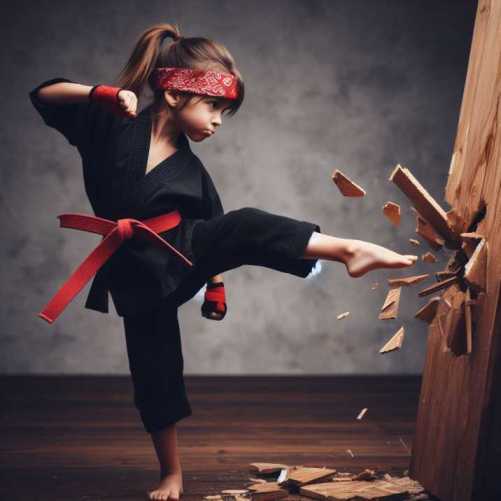Introduction:
Table of Contents
Boxing vs. Karate
In the world of combat sports, two titans stand tall—boxing vs. karate. As individuals seek the perfect blend of self-defense and fitness, the perennial question echoes: is boxing or karate better? Let’s step into the ring and the dojo to unravel the distinctive merits of these two disciplines.
Understanding the Basics: Boxing vs. Karate
Boxing:
Boxing, the “Sweet Science,” traces its roots back centuries, known for its emphasis on powerful punches and footwork. The sport’s simplicity lies in its focus on punches—jabs, crosses, hooks, and uppercuts—delivered with precision and speed.

Karate:
On the flip side, karate, originating from Okinawa, Japan, is a traditional martial art incorporating a diverse range of strikes, kicks, and blocks. Karate places significant importance on discipline, technique, and the use of the entire body in combat.
Fitness Benefits: A Ringside View
Boxing:
The intensity of a boxing workout is unmatched, with rigorous training sessions that enhance cardiovascular health, strength, and agility. Shadowboxing, bag work, and sparring sessions contribute to an efficient full-body workout.
Karate:
Karate, while also promoting cardiovascular fitness, adds an element of flexibility, balance, and mental focus to the mix. Kata, a choreographed sequence of movements, and kumite, sparring with an opponent, elevate endurance and strength.
Self-Defense Prowess: A Martial Arts Duel
Boxing:
The sheer power and precision of boxing punches make it a formidable self-defense tool. The emphasis on head movement and footwork enables boxers to evade threats effectively.
Karate:
Karate’s self-defense techniques extend beyond strikes, encompassing joint locks, throws, and blocks. Its holistic approach equips practitioners to handle a variety of physical confrontations.
Technical Nuances: Boxing vs. Karate
Boxing:
Boxing’s beauty lies in its simplicity. The strategic use of footwork, head movement, and various punches requires a deep understanding of timing and distance.
Karate:
Karate, as a martial art, involves intricate forms and stylized movements that demand precision and discipline. The belt system signifies a practitioner’s mastery, progressing from white to black.
The Mental Game: A Battle of Wits
Boxing:
The mental fortitude required in boxing is unparalleled. Fighters must read their opponents, strategize, and make split-second decisions, adding a cerebral element to the physicality.
Karate:
Karate places a strong emphasis on mental discipline, focus, and meditation. The melding of mind and body is essential for mastering the art.

The Verdict: A Split Decision or a Clear Winner?
In the quest to determine whether boxing or karate is better, it ultimately boils down to personal preference and goals. If a high-energy, intense workout with a focus on powerful strikes appeals to you, boxing might be the ideal choice. On the other hand, if you seek a holistic approach to fitness, self-defense, and mental discipline, karate could be your path.
Conclusion: A Gloved Fist or an Open Palm?
In the eternal debate of boxing vs. karate, there’s no definitive winner. Each discipline brings unique strengths to the table, catering to different preferences and goals. Whether you choose the rhythmic dance of the ring or the disciplined grace of the dojo, the most important factor is finding a martial art that resonates with you. So, lace up your gloves or tighten your black belt—your journey to self-discovery and fitness awaits.
FAQs: Your Burning Questions Answered
- Q: Which is more effective for self-defense, boxing, or karate? A: Both boxing and karate have effective self-defense techniques, but the choice depends on personal preferences and individual goals.
- Q: Can I do both boxing and karate for a well-rounded fitness routine? A: Absolutely! Combining both disciplines can offer a diverse and comprehensive approach to fitness and self-defense.
- Q: Is boxing more physically demanding than karate? A: Boxing tends to be more intense in terms of cardiovascular demands, but karate offers a unique blend of strength, flexibility, and mental focus.
- Q: How long does it take to become proficient in boxing or karate? A: Proficiency varies, but consistent practice and dedication are key to mastering either discipline.
- Q: Are there age restrictions for learning boxing or karate? A: Both sports are suitable for various age groups, with modified training programs available for children and seniors.
- Q: Which sport has a higher risk of injury, boxing, or karate? A: Both sports carry some risk of injury, but proper training techniques and safety measures can mitigate these risks.
- Q: Can I use boxing or karate for weight loss? A: Yes, both sports offer effective calorie-burning workouts that can contribute to weight loss when combined with a healthy diet.
- Q: Do I need to buy specialized equipment for either sport? A: Basic equipment like gloves and hand wraps are essential for boxing, while karate may require a gi (uniform) and protective gear.
- Q: Are there different styles of karate, and do they impact effectiveness? A: Yes, there are various styles of karate, each with its unique techniques. The impact on effectiveness depends on personal preferences and training goals.
- Q: Can practicing boxing or karate improve my mental focus in daily life? A: Yes, the mental discipline and focus cultivated in both sports can positively influence various aspects of daily life.
- Q: Do I need a sparring partner for boxing and karate training? A: While having a sparring partner can enhance training, solo drills and shadowboxing are also valuable components of both disciplines.
- Q: Can I compete professionally in boxing or karate as a beginner? A: Competing at a professional level requires extensive training and experience. Beginners should focus on skill development and gradually progress to competitive levels.


